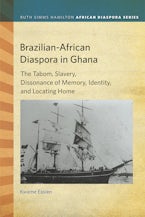Brazilian-African Diaspora in Ghana is a fresh approach, challenging both pre-existing and established notions of the African Diaspora by engaging new regions, conceptualizations, and articulations that move the field forward. This book examines the untold story of freed slaves from Brazil who thrived socially, culturally, and economically despite the challenges they encountered after they settled in Ghana. Kwame Essien goes beyond the one-dimensional approach that only focuses on British abolitionists’ funding of freed slaves’ resettlements in Africa. The new interpretation of reverse migrations examines the paradox of freedom in discussing how emancipated Brazilian-Africans came under threat from British colonial officials who introduced stringent land ordinances that deprived the freed Brazilian- Africans from owning land, particularly “Brazilian land.” Essien considers anew contention between the returnees and other entities that were simultaneously vying for control over social, political, commercial, and religious spaces in Accra and tackles the fluidity of memory and how it continues to shape Ghana’s history. The ongoing search for lost connections with the support of the Brazilian government—inspiring multiple generations of Tabom (offspring of the returnees) to travel across the Atlantic and back, especially in the last decade—illustrates the unending nature of the transatlantic diaspora journey and its impacts.
ContentsList of Figures and TablesAcknowledgmentsIntroductionPart 1. From Brazil to Ghana: Unmatched Fortitude and Locating HomeChapter 1. Reverse Diaspora: Dissonance of Memory, Voyages of Hope, and Degrees of ReturnChapter 2. Historicizing the Returnee Presence in Gã Mãŋ: Challenges and SilencesChapter 3. The Social History of Gã Mãŋ: Colonialism and Their Impact on the Brazilian-African DiasporaChapter 4. The Evolution of Land in Gã Mãŋ and Brazilian-African Diaspora: Paradox of Freedom and the Birth of ConflictsChapter 5. Escaping Slavery into Colonialism and Squabbles: How Colonial Projects and Internal Disputes Threatened Brazilian Land and FreedomPart 2. Contradictions of Return: Transporting Atlantic Traditions, Skills, and Cultures and Refashioning IdentityChapter 6. (Re-)Creating Brazilian Slavery in an Enabling Environment: The “Ghost” of SlaveryChapter 7. Contributions by the Brazilian-Africans and the Tabom: Impact on Ghana’s HistoryChapter 8. Brazilians Together, Brazilians Apart: The Family Trees and the Process of Becoming GãPart 3. Diaspora in Full Circle: Home Is Ghana, Brazil Is Our Mother CountryChapter 9. Fading Diaspora and Receding Memory: How the Brazilian Government and the Tabom Are Preserving the Brazil House and Crisscrossing the Atlantic in Full CircleChapter 10. Telescoping Lula’s Unfulfilled Promise and the Implications of the Tabom’s Visit to Brazil: A Hopeless Situation?ConclusionNotesBibliographyIndex

